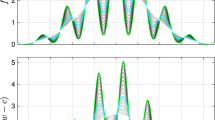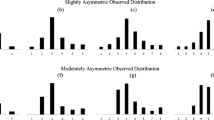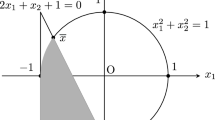Abstract
Observation systems known as errors-in-variables (EIV) models with model parameters estimated by total least squares (TLS) have been discussed for more than a century, though the terms EIV and TLS were coined much more recently. So far, it has only been shown that the inequality-constrained TLS (ICTLS) solution can be obtained by the combinatorial methods, assuming that the weight matrices of observations involved in the data vector and the data matrix are identity matrices. Although the previous works test all combinations of active sets or solution schemes in a clear way, some aspects have received little or no attention such as admissible weights, solution characteristics and numerical efficiency. Therefore, the aim of this study was to adjust the EIV model, subject to linear inequality constraints. In particular, (1) This work deals with a symmetrical positive-definite cofactor matrix that could otherwise be quite arbitrary. It also considers cross-correlations between cofactor matrices for the random coefficient matrix and the random observation vector. (2) From a theoretical perspective, we present first-order Karush–Kuhn–Tucker (KKT) necessary conditions and the second-order sufficient conditions of the inequality-constrained weighted TLS (ICWTLS) solution by analytical formulation. (3) From a numerical perspective, an active set method without combinatorial tests as well as a method based on sequential quadratic programming (SQP) is established. By way of applications, computational costs of the proposed algorithms are shown to be significantly lower than the currently existing ICTLS methods. It is also shown that the proposed methods can treat the ICWTLS problem in the case of more general weight matrices. Finally, we study the ICWTLS solution in terms of non-convex weighted TLS contours from a geometrical perspective.




Similar content being viewed by others
References
Amiri-Simkooei A, Jazaeri S (2012) Weighted total least squares formulated by standard least squares theory. J Geod Sci 2(2):113–124
Amiri-Simkooei A (2013) Application of least squares variance component estimation to errors-in-variables models. J Geod 87:935–944
Boyd S, Vandenberghe L (2004) Convex optimization. Cambridge University Press, Cambridge
De Moor B (1990) Total linear least squares with inequality constraints. ESAT-SISTA Report 1990-02, Department of Electrical Engineering, Katholieke Universiteit Leuven, Belgium
Fang X (2011) Weighted total least squares solution for applications in geodesy. PhD Dissertation, No. 294, Leibniz University, Hanover
Fang X (2013a) Weighted total least squares: necessary and sufficient conditions, fixed and random parameters. J Geod 87(8):733–749. doi:10.1007/s00190-013-0643-2
Fang X (2013b) A global solution to the inequality constrained total least squares problem. Oral presentation in VIII Hotine Marussi symposium, Rome
Fang X (2014a) A structured and constrained Total Least-Squares solution with cross-covariances. Studia Geophysica et Geodaetica 58(1):1–16. doi:10.1007/s11200-012-0671-z
Fang X (2014b) A total least squares solution for geodetic datum transformations. Acta Geodaetica et Geophysica. doi:10.1007/s40328-014-0046-8
Fletcher R (1987) Practical methods of optimization. Wiley, New York
Fritsch D (1985) Some additional informations on the capacity of the linear complementarity algorithm. In: Grafarend EW, Sanso F (eds) Optimization and design of geodetic networks. Springer, Berlin, pp 169–184
Fuller WA (1987) Measurement error models. Wiley, New York
Gleser L (1981) Estimation in a multivariate ‘errors in variables’ regression model: large sample results. Ann Stat 9(1):24–44
Golub G, Van Loan C (1980) An analysis of the total least-squares problem. SIAM J Numer Anal 17(6):883–893. doi:10.1137/0717073
Grafarend E, Awange JL (2012) Applications of linear and nonlinear models. Fixed effects, random effects, and total least squares. Springer, Berlin
Jazaeri S, Amiri-Simkooei AR, Sharifi MA (2013) Iterative algorithm for weighted total least squares adjustment. Surv Rev 46(334): 19–27
Koch A (2006) Semantic integration of two-dimensional GIS data and digital terrain models. PhD Dissertation, No. 262, Leibniz University, Hanover (in German)
Koch K (1982) Optimization of the configuration of geodetic networks. In: Proceedings of the international symposium on geodetic networks and computations, Munich
Kuhn HW, Tucker AW (1951) Nonlinear programming. In: Proceedings of 2nd Berkeley symposium, Berkeley. University of California Press, pp 481–492
Kukush A, Van Huffel S (2004) Consistency of element wise weighted total least squares estimator in a multivariate errors-in-variables model AX = B. Metrika 59(1):75–97. doi:10.1007/s001840300272
Kukush A, Markovsky I, Van Huffel S (2005) Consistency of the structured total least squares estimator in a multivariate errors-in-variables model. J Stat Plann Inference 133(2):315–358. doi:10.1016/j.jspi.2003.12.020
Li B, Shen Y, Li W (2012) The seamless model for three-dimensional datum transformation. Sci China Earth Sci 55(12):2099–2108. doi:10.1007/s11430-012-4418-z
Li B, Shen Y, Lou L (2013) Seamless multivariate affine error-in-variables transformation and its application to map rectification. Int J GIS 27(8):1572–1592. doi:10.1080/13658816.2012.760202
Lu G, Krakiwsky EJ, Lachapelle G (1993) Application of inequality constrained least squares to GPS navigation under selective availability. Manuscr Geod 1:124–130
Mahboub V (2012) On weighted total least-squares for geodetic transformation. J Geod 86(5):359–367. doi:10.1007/s00190-011-0524-5
Mahboub V, Sharifi MA (2013) On weighted total least-squares with linear and quadratic constraints. J Geod 87(3):279–286. doi:10.1007/s00190-012-0598-8
Mahboub V (2014) Variance component estimation in errors-in-variables models and a rigorous total least-squares approach. Studia Geophysica et Geodaetica 58(1):17–40
Markovsky I, Rastello M, Premoli A, Kukush A, van Huffel S (2006) The element-wise weighted total least-squares problem. Comput Stat Data Anal 50:181–209. doi:10.1016/j.csda.2004.07.014
Markovsky I, van Huffel S (2006) On weighted structured total least squares. Large-scale scientific computing, Lecture Notes in Computer Science, vol 3743. Springer, Berlin, pp 695–702. doi:10.1007/11666806_80
Neitzel F (2010) Generalization of total least-squares on example of unweighted and weighted 2D similarity transformation. J Geod 84:751–762. doi:10.1007/s00190-010-0408-0
Nocedal J, Wright SJ (2006) Numerical optimization. Springer, Berlin
Peng J, Zhang H, Shong S, Guo C (2006) An aggregate constraint method for inequality-constrained least squares problems. J Geod 79:705–713. doi:10.1007/s00190-006-0026-z
Roese-Koerner L, Devaraju B, Schuh WD, Sneeuw N (2011) Describing the quality of inequality constrained estimates. In: Proceedings of the 1st international workshop on the quality of geodetic observation and monitoring systems. Springer, Garching
Roese-Koerner L, Devaraju B, Sneeuw N, Schuh WD (2012a) A stochastic framework for inequality constrained estimation. J Geod 86:1005–1018. doi:10.1007/s00190-012-0560-9
Roese-Koerner L, Krasbutter I, Schuh WD (2012b) A constrained quadratic programming technique for data-adaptive design of decorrelation filters. In: Sneeuw N et al (ed) VII Hotine-Marussi symposium on mathematical geodesy, IAG Symposia, vol 137. Springer, Berlin, pp 165–170
Roese-Koerner L , Schuh WD (2014) Convex optimization under inequality constraints in rank-deficient systems. J Geod. doi:10.1007/s00190-014-0692-1
Schaffrin B, Krumm F, Fritsch D (1980) Positiv-diagonale Genauigkeitsoptimierung von Realnetzen über den Komplementaritäts-Algorithmus. In: Conzett R, Matthias H, Schmid H (eds) Ingeni-eurvermessung 80–Beiträge zum VIII. Internationalen Kurs für Ingenieurvermessung, vol 1. Ferd. Dümmlers Verlag, ETH Zürich, pp A15–A15/19 (in German)
Schaffrin B (1981) Parameter estimation with inequality constraints. Allgemeine Vermessungs-Nachrichten 88:227–238 (in German)
Schaffrin B, Felus YA (2005). On total least-squares adjustment with constraints. In: Sansò F. (Ed.), A Window on the Future of Geodesy. International Association of Geodesy Symposia, vol 128. Springer, Berlin, pp 175–180
Schaffrin B, Felus Y (2008) On the multivariate total least-squares approach to empirical coordinate transformations. Three algorithms. J Geod 82:373–383. doi:10.1007/s00190-007-0186-5
Schaffrin B, Wieser A (2008) On weighted total least-squares adjustment for linear regression. J Geod 82:415–421. doi:10.1007/s00190-007-0190-9
Schaffrin B, Felus Y (2009) An algorithmic approach to the total least-squares problem with linear and quadratic constraints. Studia Geophysica et Geodaetica 53(1):1–16. doi:10.1007/s11200-009-0001-2
Schaffrin B, Wieser A (2009) Empirical affine reference frame transformations by weighted multivariate TLS adjustment. In: Drewes H (ed) Geodetic reference frames, IAG symposium, Munich, International Association of Geodesy Symposia, vol 134. Springer, Berlin
Schaffrin B, Neitzel F, Uzum S (2009) Empirical similarity transformation via TLS-adjustment: exact solution vs. Cadzow’s approximation. International Geomatics Forum, Qingdao
Schaffrin B, Neitzel F, Uzun S, Mahboub V (2012) Modifying Cadzow’s algorithm to generate the optimal TLS-solution for the structured EIV-model of a similarity transformation. J Geod Sci 2(2):98–106. doi:10.2478/v10156-011-0028-5
Schuermans M, Markovsky I, Van Huffel S (2007) An adapted version of the element-wise weighted total least squares method for applications in chemometrics. Chemometr Intell Lab Syst 85:40–46. doi:10.1016/j.chemolab.2006.04.003
Shen Y, Li B, Chen Y (2011) An iterative solution to weighted total least squares adjustment. J Geod 85(4):229–238. doi:10.1007/s00190-010-0431-1
Sima DM, van Huffel S, Golub GH (2004) Regularized total least-squares based on quadratic eigenvalue problem solver. BIT 44:793–812. doi:10.1007/s10543-004-6024-8
Snow K (2012) Topics in total least-squares adjustment within the errors-in-variables model: singular cofactor matrices and priori information. PhD Dissertation, Report No, 502, Geodetic Science Program, School of Earth Sciences, The Ohio State University, Columbus
Song Y, Zhu J, Li Z (2010) The least-squares estimation of adjustment model constrained by some non-negative parameters. Surv Rev 42(315):62–71
Van Huffel S, Vandewalle J (1991) The total least -squares problem., Computational Aspects and AnalysisSociety for Industrial and Applied Mathematics, Philadelphia
Wölle NA (1988) Graphical estimation through quadratic programming with linear equalities and inequalities. Diploma thesis, Technical University of Graz (in German)
Xu PL, Cannon E, Lachapelle G (1999) Stabilizing ill-conditioned linear complementarity problems. J Geod 73:204–213. doi:10.1007/s001900050237
Xu PL (2003) A hybrid global optimization method: the multi-dimensional case. J Comput Appl Math 155(2):423–446. doi:10.1016/S0377-0427(02)00878-6
Xu PL, Liu JN, Shi C (2012) Total least squares adjustment in partial errors-in-variables models: algorithm and statistical analysis. J Geod 86(8):661–675. doi:10.1007/s00190-012-0552-9
Xu PL, Liu JN (2014) Variance components in errors-in-variables models: estimability, stability and bias analysis. J Geod. doi:10.1007/s00190-014-0717-9
Zhang S, Tong X, Zhang K (2013) A solution to EIV model with inequality constraints and its geodetic applications. J Geod 87(1):23–28. doi:10.1007/s00190-012-0575-2
Zhu J, Santerre R, Chang XW (2005) A bayesian method for linear, inequality-constrained adjustment and its application to GPS positioning. J Geod 78:528–534. doi:10.1007/s00190-004-0425-y
Acknowledgments
I would like to thank the President at the Federal Agency for Cartography and Geodesy (BKG) in Germany, Prof. Kutterer, for his guidance, and appreciate the helpful recommendations on the preliminary manuscript by three unknown reviewers.
Author information
Authors and Affiliations
Corresponding author
Rights and permissions
About this article
Cite this article
Fang, X. On non-combinatorial weighted total least squares with inequality constraints. J Geod 88, 805–816 (2014). https://doi.org/10.1007/s00190-014-0723-y
Received:
Accepted:
Published:
Issue Date:
DOI: https://doi.org/10.1007/s00190-014-0723-y




